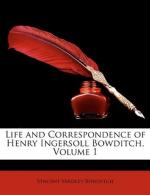|
This section contains 332 words (approx. 2 pages at 300 words per page) |
Encyclopedia of World Biography on Henry Ingersoll Bowditch
The American physician Henry Ingersoll Bowditch (1808-1892) did research on chest diseases and established the first board of health in Massachusetts. He was also an ardent antislavery crusader.
Henry I. Bowditch, son of the mathematician Nathaniel Bowditch, was born on Aug. 9, 1808, in Salem, Mass. He graduated from Harvard College in 1828, earned his medical degree there in 1832, and studied in Paris for 2 years with leading physicians, such as P. G. A. Louis.
He was in England in 1833, when William Wilberforce died. Wilberforce's antislavery writings had impressed him, and when Bowditch returned to Boston, he became a militant abolitionist. When slave masters came to Massachusetts to retrieve fugitive slaves, Bowditch, who belonged to a secretly trained group of abolitionists, joined his friends to protect the runaways. He was proud of his friendship with black leader Frederick Douglass.
Bowditch was a physician at the Massachusetts General Hospital from 1838 until his death. In 1846 he published The Young Stethoscopist, dealing with diseases of the chest. Five years later he advocated paracentesis (puncturing of the pleural cavity to drain liquid deposits) and showed how the technique had become less complex and painful. Tuberculosis was also one of his lifelong concerns, and he made detailed studies of its etiology, publishing his conclusions in Consumption in New England; or Locality One of Its Chief Causes (1862). When his son Nathaniel died on a Civil War battlefield from the lack of care, Bowditch wrote a pamphlet advocating an ambulance system to care for the wounded.
From 1859 to 1867 Bowditch was Jackson professor of clinical medicine at Harvard and then began his great service in behalf of public health. He founded the Massachusetts State Board of Health, the second of its kind in the United States, and became its first chairman (1869-1879). His most significant book, Public Hygiene in America (1877), was an important stimulus to the rising popular concern over public health. He was a fellow of the American Academy and president of the American Medical Association in 1877. He died on Jan. 14, 1892.
|
This section contains 332 words (approx. 2 pages at 300 words per page) |


